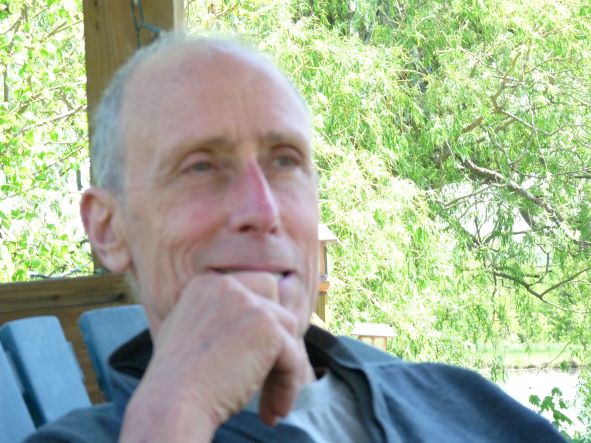As with Mitra Bishop’s Mountain Gate in New Mexico, there is no signage identifying the Zen Center located on the Lieb Road in Spencer, New York, south of Ithaca. One has to know that mailbox 56 marks the drive. A gravel road leads to an area with a cluster of small cabins on one side and, on the other, a large pond with several small wooden bridges leading to islands just large enough for a chair or two. A smaller koi pond is in front of the dining room, and there is a third pond behind the site, with a dam which keeps the roped off swimming area from silting up. It is a quiet place; the calls of frogs and birds are clear in the air.
Still, people find their way here. In fact, the cabins were full the weekend of my visit because it happened to be graduation at Cornell University, and all local accommodations—including the Zen Center—were booked.
I had interviewed David Radin—Yoshin—by Skype in January 2014, but, when I happened to be in New York state a few months later, I took advantage of the opportunity to visit the site and meet him in person. I also curious to meet his wife, Marcia—or Khadija—who is both a nun in the Rinzai-ji lineage and a Sufi Sheikha. “I see Zen and Sufism as the same thing,” she tells me.

At the back of the property is a small zendo set up with a tea area on one side of a set of shoji screens then three rows of tans with seating for 15. When the shoji screens come down, three more places can be added to each row.
The dormitories and cabins on the site, however, are not so much for the benefit of the Zen practitioners as they are for the summer Body Mind Restoration Retreats which Khadija developed. These are also the primary income generator; they, in effect support the Zen program. The retreats—raw vegan food only—may have sixty or more attendees. In addition to the participants, there is a staff of 17 to look after maintaining gardens, housekeeping, etc., who are also able to participate to an extent in the retreats. Tent platforms are scattered throughout the site to provide more space for people.
Khadija had been a teacher of Sufism before becoming involved with Zen. She attended her first sesshin with Joshu Sasaki because he was David’s teacher. “Roshi always acknowledged that I was a Sufi teacher, and trained me differently than he trained his other students. When roshi ordained me as a nun, I asked, ‘Roshi, what’s incumbent upon me becoming a nun?’ And he looked and me and said, ‘For you, absolutely nothing.’ And I said, ‘Oh! I’m a Nun of the Above!’ And then David said, ‘And I’m finally second to Nun.’”
Joshu Sasaki’s reputation was tainted during the last years of his life after it had been revealed that he had behaved inappropriately with female students during private interviews. Yoshin, however, remains loyal to his memory. He edited a book which celebrated Sasaki’s one hundredth year. He named his first child, a daughter, “Joshi” after him. “Roshi was able to transmit the highest wisdom,” Yoshin tells me. I ask how he did that. “First there was a sense that he was residing in a different residence than I was residing . . . I am an individual seeking the higher wisdom. He seemed to be radiating from the higher wisdom . . . He could, through koan training and just his own presence, he could evoke that experience within me.”
Yoshin’s personal story is interesting. He grew up in New York, the son of a rabbi, and attended Jewish Parochial School. “It kept me out of bars and brothels.” After graduating high school, he went on a trip around the world, and in places like Hawaii and India discovered hashish and LSD. A number of Zen practitioners from the late 60s and early 70s—including me—followed a similar path to Zen practice.
He did a sesshin with Richard Baker at the San Francisco Zen Center, but the experience was “unfruitful. A lot of pain and no intelligence.” He went back to New York state to live on a commune. I ask how he supported himself. “Chopping wood and hauling water. Literally.” It was a working farm but not self-sustaining.
A friend in Canada suggested he try a retreat at Mount Baldy with Joshu Sasaki, and during that retreat he had experiences so moving that—at one point—he couldn’t return to the zendo after an interview with the Roshi but, instead, hid behind the building and lay beneath a tree just relishing the insights he had acquired.
Sasaki Roshi did not give full transmission to any of his oshos. When I ask Yoshin what he thinks will happen to the Rinzai-ji lineage after Sasaki’s death (which occurred two months after our conversation), he tells me he doesn’t “have any concern about it. . . It doesn’t make a difference to me whether the line continues or not. It’s just the question of whether the wisdom continues.”
Cypress Trees in the Garden: 55-66, 469
Zen Conversations: 124
Other Links:
https://rickmdaniel.blogspot.com/2014/05/525-sheikha-khadija-radin.html

2 thoughts on “David Yoshin Radin”